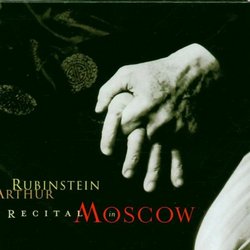| All Artists: Rubinstein, Schumann, Debussy, Villa-Lobos Title: Rubinstein Collection, Vol. 62: Recital in Moscow Members Wishing: 1 Total Copies: 0 Label: RCA Red Seal 63062-2 Release Date: 10/10/2000 Album Type: Original recording remastered Genres: Dance & Electronic, Classical Styles: Chamber Music, Forms & Genres, Sonatas, Historical Periods, Classical (c.1770-1830), Modern, 20th, & 21st Century, Romantic (c.1820-1910) Number of Discs: 2 SwapaCD Credits: 2 UPC: 090266306220 |
Search - Rubinstein, Schumann, Debussy :: Rubinstein Collection, Vol. 62: Recital in Moscow
 | Rubinstein, Schumann, Debussy Rubinstein Collection, Vol. 62: Recital in Moscow Genres: Dance & Electronic, Classical
|
Larger Image |
CD DetailsSimilar CDs
|
CD ReviewsRubinstein's 1964 Recital in Moscow 11/20/2000 (5 out of 5 stars) "It would be impossible to tell you how astonished I was to hear and re-hear this live recording. Being only 21, I've only heard his recordings that are very beautiful and sometimes a bit too cautious. Hearing this concert, I can believe every word people have told me about Rubinstein "in concert". That his sound was golden, his charisma overwhelming and that he continued to be their favorite. I couldn't see why, when I'd heard the Horowitz live recordings and what-not.. I'm absolutely convinced now of what a Master he was and I feel very fortunate to have heard him and bought this recording. A critic from Stereophile said it best: "If there's a single evening in which Rubinstein was everything he was and would be, it's this. He simply plays like a god."BUY THIS RECORDING!!!!!!" Rubinstein Live... Almost Hank Drake | Cleveland, OH United States | 10/16/2000 (4 out of 5 stars) "This 2 CD set features one of the rare recorded examples of Arthur Rubinstein in live performance. For those only familiar with his studio recordings, these CDs will be something of a revelation. In front of an audience, Rubinstein became infinitely more fired up and abandoned any pretense at note perfect performances. On occasion, he would become so caught up in the moment that he would suffer a memory lapse--which he would skillfully cover up, improvising and finding his way back to the music without batting an eye. For his 1964 Moscow recital--given in the same hall where Horowitz gave his historic 1986 recital--Rubinstein chose an all Chopin program (except for the encores, which Rubinstein announces in Russian).The Chopin Sonata, Op. 35 is given a more fiery, powerful performance than in his 1961 studio version. The "Descent into Hell" episode midway throught the first movement is indeed terrifying. Rubinstein ran off the rails during the Scherzo, and RCA has spliced in a portion from Rubinstein's studio recording. (The touching up of "live" recordings is commonplace. But it would have been helpful if RCA had included the untouched Scherzo as an appendix, as it is an excellent example of how Rubinstein could cover up memory lapses.)The two Chopin Polonaises are played in a splashy manner altogether different than in Rubinstein's more formal 1964 studio versions. They recall his legendary earlier recording from the 1930s.We also have a rare example here of Rubinstein playing Chopin Etudes. Rubinstein attempted to record a complete set of Etudes in the early 1970s, but abandoned the project after one session. This is a pity, because the brilliance of these live performances indicates it would have been a stunning set--note-perfect or not. The recorded sound is passable, although it is not listed as such, it sounds like mono to my ears. Recommended for all fans of great piano playing." Rubinstein at his zenith Michael Whincop | GRIFFITH UNIVERSITY, QLD AUSTRALIA | 03/24/2001 (5 out of 5 stars) "The concert from which this recording was taken had its origins in diplomacy, and the "trade" between the east and the west of their great pianists. Here, Rubinstein returned to Moscow, which of all cities has witnessed some of the very greatest pianistic talents, for the first time in over half a century. This undeniable sense of occasion comes over in the recording. It demonstrates how Rubinstein could respond to the exigencies of a great occasion, something his studio legacy only really hints at.The core of this set is his performance of the Second Sonata, one of the most dramatic ever recorded. At the opening, which sounds the ur-motif, which from which much of the music is generated, Rubinstein makes his intentions clear, playing the music faster in grim black-sounding chords. The first movement is keenly dramatic, arousing the Moscow audience to applaud, a breach of protocol that we can relate to. The scherzo has similar dramatic qualities, relenting only in the middle section. The funeral march chooses an ideal moderate tempo, not as slow as, say, Kissin or Sokolov, not as fast as Cortot. Rubinstein yet builds up a tremendous sense of power in the return from the middle berceuse, anxious, vehement, and foreboding. It is far superior to his studio recording of the work, and is surely amongst the finest of all.The other big dramatic pieces he chooses -- the fifth and sixth polonaises are charged with the same electricity. The A flat in particular is a miracle, its middle section, in which Liszt heard the hooves of the Polish cavalry, pulsates ferociously in a superb crescendo. Yet Rubinstein's program allows him to show a complete picture of Chopin -- the glorious bel canto lyricism of the Barcarolle is on display, as is the wistful langour of the a minor waltz. To cap this, Rubinstein shows Chopin's grace in a touching performance of the D flat nocturne and his wit in characterisation in the four Etudes (and how often do you find wit in performances of these works?)The encores are very fine. Rubinstein chooses to play one Chopin waltz and pieces by Debussy, Schumann and Villa-Lobos (the latter in particular is wonderful).Viewed objectively, the disk is not very good value -- a single disk could have been used for the program and the Chopin encore. But the music-making is so fine that the disk is worth twice the asking price."
|

 Track Listings (8) - Disc #1
Track Listings (8) - Disc #1